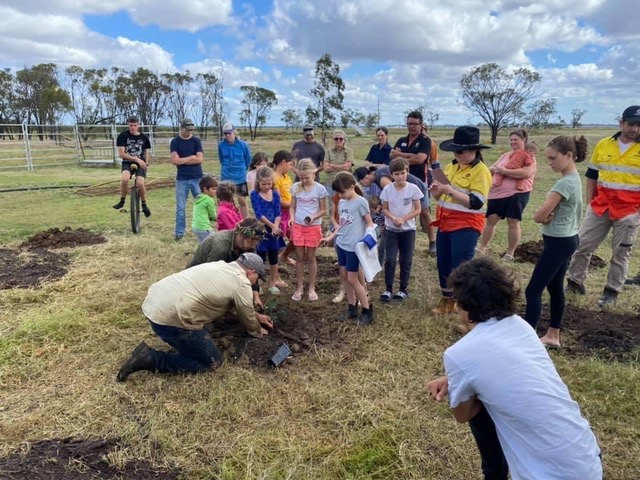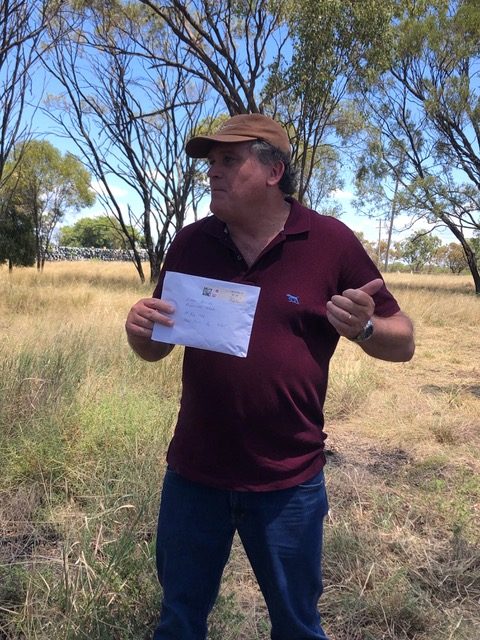Working together with the soil and caring for the farm animals and trees that benefit from it.
BAPTIST pastor Alan Black, who established the Bethel Christian home for children on the Western Downs of Queensland in 1952, would be proud to see how the Dhiiyaan Aboriginal Centre has carried on his legacy.
Based at Dalby, 210 km from Brisbane, the Dhiiyaan centre has been the custodian of the 16-ha property for eight years developing an indigenous-led initiative that is teaching young people practical skills in forestry and farming.
“It’s about a connection with country, giving young people a sense of purpose and self-worth,” says Vicki Williams, finance administrator of the Brisbane-based Dhiiyaan Aboriginal Corporation.
“This is also a space where new friendships can be developed and health and trauma issues can be healed, encouraged by young groups working together with the soil and caring for the farm animals that benefit from it. And trees are a very important part of this.”
A big productive notch in Queensland’s Brigalow Belt – a wide band of acacia-populated grassland that runs between the tropical rainforest of the coast and the semi-arid interior of the state – the Dhiiyaan property has areas of mature mulga and red gums giving shade for cattle and horses … “and don’t forget the free-range chickens”.
But the property’s tree program got a boost in March with 200,000 Chinchilla white gum seeds (Eucalyptus argophloia) gifted by HQPlantations, one of Australia’s largest growers of certified plantations.
The seeds were presented to the Dhiiyaan centre at Dalby by Simon Dorries, CEO of Responsible Wood, further expanding its spread of sustainable forest accreditation in Queensland.
“The donation by HQPlantations will further highlight the great work under way at Dhilyaan and it was a privilege to support the aims and objectives of the organisation,” Mr Dorries said.
Vicki Williams said the seeds were welcome in a region that experienced harsh weather extremes.

Responsible Wood CEO Simon Dorries was on hand to present the seeds
“We’re hoping for 10,000 trees in 10 years,” she said. “A tough target I know but we’re going for it.”
Dhilyaan will propagate the seeds in its own greenhouse for either a January or autumn planting next year, depending on the season and taking advice from the forest industry and a local nursery.
The property with heavy clay soils has been blessed with record rains and the farm dam “the size of two Olympic swimming pools” is overflowing.
By adapting Yeoman’s plough and biodynamic farming methods, the property hopes to get some good healthy bacteria back into the soil.
“The Dhiiyaan community has ebbed and flowed through 17 years and the hard-earned lessons have created a culture of hospitality, integrity and humility among members,” Vicki Willliams said.
“We have had the privilege of being the custodians of our property for eight years, and this has had an incredible influence on all of us and how we live,” she said.
“A particular focus for our community has become an initiative we call True Fella, a name taken from a song by the Warumpi Band.
“For us it represents an opportunity to work and walk with young people who can benefit from a community and property that have the same passions that we have. This also includes conducting camps that give the opportunity to connect to ‘Creator, Country and Community’, a ‘whole-of-life’ support for families.
“Young people are given the opportunity to visit on weekends and at other times Dhiiyaan is a meeting place for a loving and safe community.”
The Darling Downs was inhabited by the indigenous tribes of the Jagera, Giabal and Jarowair people for at least 40,000 years before European settlement. Estimations place the indigenous population pre-settlement from 1500 to 2500 people. This was originally known as the ‘upland area’ and indigenous people used a technique in hunting food where they would burn the grasslands with the new, green sprouts attracting animals. This earned them the name ‘Gooneburra’, or ‘the ones who hunt with fire’, by coastal tribes.
The sister Dhiiyaan Aboriginal Centre at Moree, 630 km north of Sydney, holds one of the state’s largest collections of Aboriginal family records. The Dhiiyaan provides a wonderful space for community to enjoy and learn about Aboriginal culture. With more than 100,000 artefacts and documents in its collection, including genealogies, a database of Aboriginal ex-service people, books, local photographs and burial records, the centre is able to assist with family, local and Gamilaroi history inquiries.







